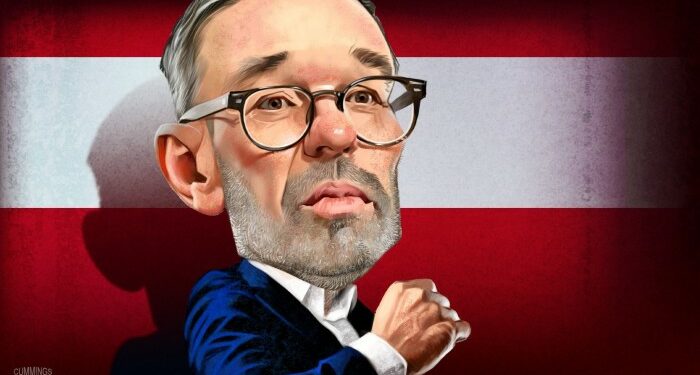Roula Khalaf, Editor of the FT, selects her favourite stories in this weekly newsletter.
For years Herbert Kickl was written off by many, including party comrades, as a figure best suited for work behind the scenes. An Eigenbrötler, they joked: someone who bakes their own bread. Now, he looks almost certain to be Austria’s next chancellor — one of the most successful figureheads for Europe’s insurgent far right.
Last Saturday, coalition talks between Austria’s mainstream parties broke down, making the 56-year-old, whose Freedom party scored 29 per cent of the national vote in September, the leading candidate for residency of the Ballhausplatz, Austria’s seat of power.
When Kickl became party leader in 2021, succeeding the stop-gap leader Norbert Hofer, a replacement for the clubbable Heinz-Christian Strache, and before him, the charismatic provocateur Jörg Haider, few had great expectations. Known as a prickly, divisive figure, albeit one with a powerful way with words, Kickl was seen as a place holder rather than a champion. Five years of almost perpetual political turmoil in Vienna have changed that.
“Kickl has positioned himself with a great deal of strategic patience as this repository for anger and disaffection in Austria,” says Marcus How, head of research at VE Insight, a political consultancy. “He is without question the most capable of the party leaders. He is patient and he is analytical. And he has brought discipline to a party which is often quite restive.”
Founded in 1956, the Freedom party has long been a fixture at the ballot box and has served three spells in government — but never as the leading party. Under Kickl, many in the party now believe, it has finally broken through.
Born in 1968 to a blue collar family in southern Austria, Kickl’s early fortunes owed much to the social welfare state built by the then dominant Social Democratic party. The local grammar school he attended in Spittal an der Drau was brand new. The state funded his studies at university.
Kickl enrolled to study journalism and political science at the University of Vienna in 1988, but soon switched to the philosophy department. It was there, captivated by lectures given by professor Franz Ungler, that he found an intellectual guide in Hegel, the German philosopher. “The dialectical process has become a part of me,” he told the Austrian tabloid Kronen Zeitung in 2019.
That obsession perhaps explains one of his political strengths: saying things not merely because of what they mean, but because of what he expects the reaction to them to be. It’s in this context, say some analysts, that Kickl’s flirtation with Nazi slogans — hints at which were an element of the Freedom party’s recent election campaign — should be read. Kickl is no Nazi, but it suits his goals to have a liberal establishment frothing at the mouth that he is.
Kickl joined the Freedom party in 1995, at a time when Haider was reshaping its image. Kickl had seen Haider speak at his school and been star-struck. Years later, a job offer came — with a number left on a beer mat by a party apparatchik. Kickl leapt at the chance.
Rising to become Haider’s speechwriter, he honed a knack for penning witty, inflammatory slogans. Sometimes he crossed lines, as when in 2001 Haider (in a speech written by Kickl) responded to criticism by the leader of Vienna’s Jewish community, Ariel Muzicant: “How can anyone called Ariel have so much dirt stuck to them?”
Haider left to set up his own party in 2005, which Kickl regarded as an act of betrayal. He remained with the Freedom party and became interior minister when the party entered government as the junior partner in 2017.
Mocked by the liberal press for pet projects such as an obsession with mounted police forces, he quietly sought to remake the ministry. Convinced that Austria’s intelligence service was deeply hostile, he tried to reorganise it. A police raid on its premises in 2018 led other western intelligence agencies to sever contacts with Austria.
It was at this time that Wirecard’s Jan Marsalek — exposed by the FT in 2020 as a Russian spy — was busy cultivating links with those close to the interior minister. To date, the controversies surrounding the Freedom party and its closeness to Russia have blown over Kickl. Though publicly opposed to support for Ukraine and sanctions against Russia, Kickl was never in the party’s core Russophile faction.
When Strache was filmed in 2019 in a sting operation in Ibiza soliciting support from a fake Russian oligarch’s niece — a scandal that brought down the government — Kickl was appalled. At a meeting of party leaders, Kickl strode into the room and with two words — “that’s it” — ended his leader’s career.
“Kickl doesn’t really fit at all into the traditional wings of the party,” says Lothar Höbelt, an Austrian historian and longtime party supporter. “He’s neither a German nationalist Burschenschaftler [member of a student fraternity] nor a liberal free marketeer.”
The chancellorship would be a powerful pulpit for Kickl. He has already proven his mettle, relishing an election campaign in which he gave barnstorming speeches to rapturous applause.
Sport is the other great passion in the ascetic’s life. His name crops up in stamina-testing competitions across Europe: the Celtman extreme triathlon in Scotland, and the Evergreen Endurance Triathlon in Chamonix.
Speaking on Tuesday, Kickl had a message for his would-be coalition partners, the People’s party: submit to a greatly reduced role in government. Otherwise, he said, “I can say that’s it.”
“There will be new elections,” he threatened, adding with the casual confidence of an athlete playing a long game against an exhausted opponent: “We are prepared.”
Source link : http://www.bing.com/news/apiclick.aspx?ref=FexRss&aid=&tid=67820d9918ea4dd09bc6acec457cda10&url=https%3A%2F%2Fwww.ft.com%2Fcontent%2Fec695f80-6cf5-4430-896e-7ace3b8e779d&c=3654746484531212318&mkt=de-de
Author :
Publish date : 2025-01-10 21:00:00
Copyright for syndicated content belongs to the linked Source.


